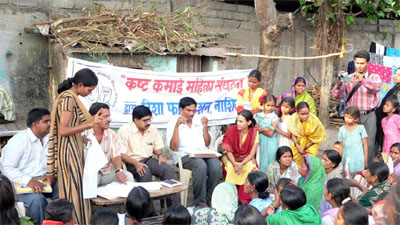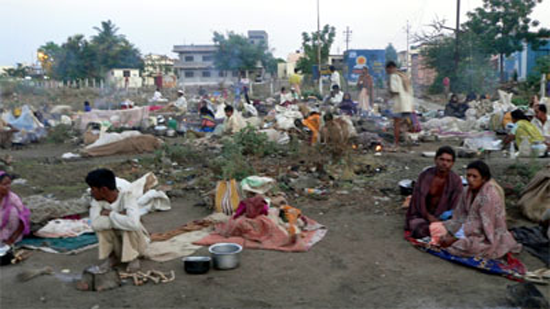Feb 05, 2026
Feb 05, 2026

Suman Bai, Vimal Bai Pagar and Janaka Bhoye live on the streets and have recently won a major victory - a temporary ration card. For them this is a huge win, as they are all migrants and it is impossible for this group to get a ration card.
The three belong to a group of about 50 migrants in Nashik who started their struggle in 2001. The workers were supported by Anjali Borhade and her organization, Disha Foundation, an NGO. This is the first time that ration cards have been issued to migrants anywhere in the country.
"One category of people who inevitably get left out by the Public Distribution System (PDS) are migrant workers. As they do not live in their native place, they are not able to access facilities specially meant for the poor. It was this thought, and also the realization that these people aid the development of the city by providing cheap labor, and hence deserve a better life, that we started working for ration cards for migrant workers."

Nashik city is witnessing a boom in construction work, which makes it an obvious destination for migrant workers from Maharahstra, Gujarat and Andhra Pradesh. There are some 8,000 poor families who come to work for 10 months every year to Nashik. They camp in the open, in 'nakas' or camps, without any amenities. Food insecurity is high among this population as employment - construction work or agricultural labor, is highly irregular.
The migrant labor system in Nashik is very different to the kind prevalent in other cities. Here, no labor contractors go to villages and fetch workers. The workers come on their own, usually with their entire families, and stay in the nakas. They cannot even put up tents for fear of police harassment.
"Initially, when we took up the issue with the PDS officials in 2001," says Borhade, "The department did not respond despite repeated follow-ups. We took out demonstrations and ran campaigns (some jointly with the Rationing Kruti Samiti - a pressure group working in Maharashtra) for the effective implementation of PDS. More than a 100 migrant workers sacrificed their daily wages for days together to join the struggle."
Fortunately, the Additional Collector Shekhar Meshram Gaikwad proved to be sensitive, and agreed to talk with the migrants. The migrant workers participated in the discussions enthusiastically. Vimalbai Pagar, Janka Bhoye, Baba Tathe, Maruti Labde and others presented their side of the story very lucidly.
Their efforts bore fruit and application forms were issued. But the migrants were unable to furnish income proof or submit the employers'
recommendation. Again, the group held discussions with the PDS officials on it and the rules were relaxed.
There were other problems too - after intense lobbying, the group fought for and got permanent ration cards for 185 migrant workers in Nashik. But each time they had to buy food, they were expected to return back to their native place. This did not suit the migrants who had to stay most of the year in Nashik.
So Borhade and her organisation decided to work for temporary ration cards.
In September 2005, 50 migrant workers from different parts of Maharashtra were issued temporary ration cards for four months. The duration of these cards can be extended on demand. "It is only later that we found that this was the first time that migrants anywhere had been issued cards," says a proud Borhade.
To avoid duplication, Disha Foundation deviced a simple mechanism. "When the temporary ration card is issued, the worker is required to deposit his or her original ration card from his native place with us. When they return to their state, they return the migrant card."
The Foundation also wanted to ensure that the workers did get rations on their cards. For this, a tripartite documentation system involving the shopkeeper, the card-holder and Disha Foundation was worked out. "Now the ration shopowner cannot make excuses and deny us rations," says a triumphant Pagar.
The Foundation is now also working on a food passport. "Since migrant workers travel to many towns, besides Nashik, getting a temporary ration card for every place is a difficult prospect. We are working with Gaikwad on a 'food passport' for migrant workers. This passport will enable them to get Below the Poverty Level (BPL) rations in any part of the state they work."
The other area is that of inter-state migrants. "The temporary ration cards have been issued only to migrants from Maharashtra," says Borhade. "But migrants from other states deserve the same facilities. Hence, we are trying to evolve an inter-state coordination system through with workers from one state can get temporary ration cards in any other state where they are working."
Of course, getting ration cards is just one small step in overhauling the PDS in the country. "In Nashik, as elsewhere, there are many problems with PDS. There is large-scale corruption in the distribution of rations, especially BPL rations. The fight for ration cards will eventually grow into a fight for rations. We are preparing for that," she says with a faraway look in her eyes.
By arrangement with WFS
06-Nov-2005
More by : Aparna Pallavi